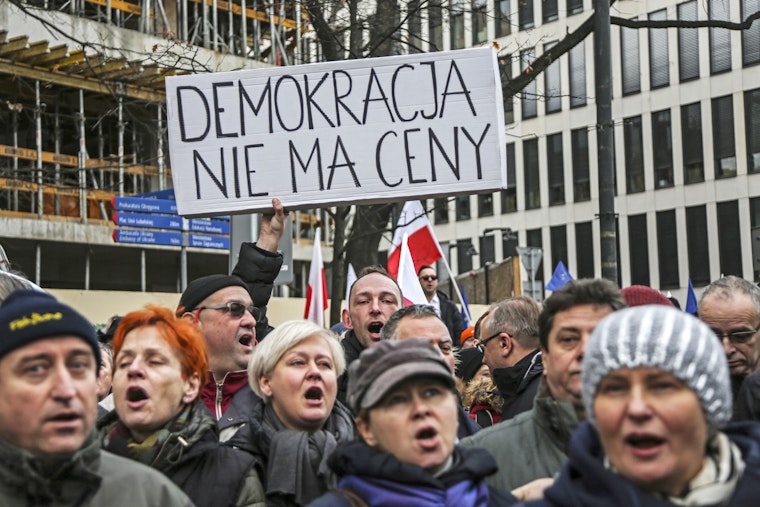Citizens Push Back Against Polish Ruling Party’s Abuse of Power
By Katarzyna Szymielewicz

When a ruling party consolidates control, it’s legitimate cause for anxiety. This is what’s happening right now in Poland, where the one-month-old government is taking steps to override democratic practices.
The elections on November 16 swept the national conservative Law and Justice Party (Prawo i Sprawiedliwość, or PiS) into power with an absolute majority. It’s the first time since 1989 that one party has held a majority in the parliament. The president—who also holds legislative powers—is a PiS affiliate as well.
A few weeks into their mandate, the PiS replaced five judges on the Constitutional Tribunal, the judicial body that assesses whether proposed and existing laws adhere to the Polish constitution. All five of those judges had been appointed by the previous parliament. PiS not only questioned the legality of those appointments, but also changed the rules for appointing new judges. The vote that enabled this was taken in parliament in the middle of the night with practically no debate, and effectively disrupted the Constitutional Tribunal’s ability to function.
A court ruled shortly thereafter that the PiS’s actions might be unconstitutional, a ruling that the president promptly disregarded on the grounds that too few of the court’s judges weighed in. By controlling the constitutional court, the government blocked the only remaining way to oppose unconstitutional laws. In an unprecedented assault on Poland’s democratic system, the ruling party effectively wiped out any semblance of checks and balances, in essence declaring itself above the law.
This troubling development sparked the mobilization of a group of concerned citizens. A couple hundred of us protested outside the parliament on December 2—a demonstration that ultimately grew into a sustained, nonpartisan grassroots effort to monitor government actions. The most recent protest, organized on December 12 by a coalition of civic groups and parliamentary opposition in response to the president’s decision to disregard the aforementioned ruling of the court, drew as many as 50,000 people.
This movement is made up of many civic groups formed by people active in NGOs—people with long records of defending human rights and the rule of law. We think of ourselves as angry citizens, without political or organizational affiliation. We don’t even have a logo or formal name—online we use #WeAreWatchingYou (#PatrzymyNaWas) as our hashtag. We are not against PiS, or in favor of any other party. Our agenda is one that advances the rights of all Polish citizens. We call for respect for democratic standards, human rights, and the rule of law.
To date, the actions of the ruling party ignore democratic standards and procedures. Not only did they speed up procedures to the extent that they were able to pass a law in one day, they also shut down political debate.
On the day when the new Constitutional Tribunal judges were appointed, citizens who only wanted to watch the vote were barred from parliament. By pushing legislation through in a form of parliamentary drafts—instead of ministerial initiatives, as is customary in Poland—PiS left no room for public consultation, a mandatory step in initiating a law. Even more worrying, the ruling party refuses to see any problem in excluding civil society from public debate on such drastic changes in the legal landscape. As the head of PiS’s executive committee, Joachim Brudziński, put it: “Citizens can protest all they want, but it will not divert the party from its set course.”
Worrying trends have already emerged in a number of other governmental announcements. For example, plans are afoot to nationalize all media and focus their role on promoting national values. This may result in purging from the existing public broadcaster anyone who disagrees with official positions. PiS is also planning major changes in education, including rolling back school reforms.
Another worrying announcement involved the establishment of a new intelligence service responsible for electronic surveillance. It seems that PiS not only wants to maintain full political control over existing surveillance powers (the heads of intelligence services have already been replaced) but also seeks new ones, which will be vested in the Polish equivalent of the United States’ NSA. Taking into account the security paradigm and style of governing already exhibited by PiS, new powers such as these may not be counterbalanced with adequate legal safeguards.
Together, these pervasive and systemic changes affect many areas of public and private life—changes that limit citizens’ rights and undermine the rule of law. Under these circumstances, we feel that the mobilization and reorganization of Polish civil society is now more important than ever. We are determined to continue exercising our right to scrutinize our elected representatives, call for greater transparency, and “watch” the actions of our government.
The Panoptykon Foundation is a grantee of the Open Society Foundations.
Katarzyna Szymielewicz is president of the Panoptykon Foundation.


